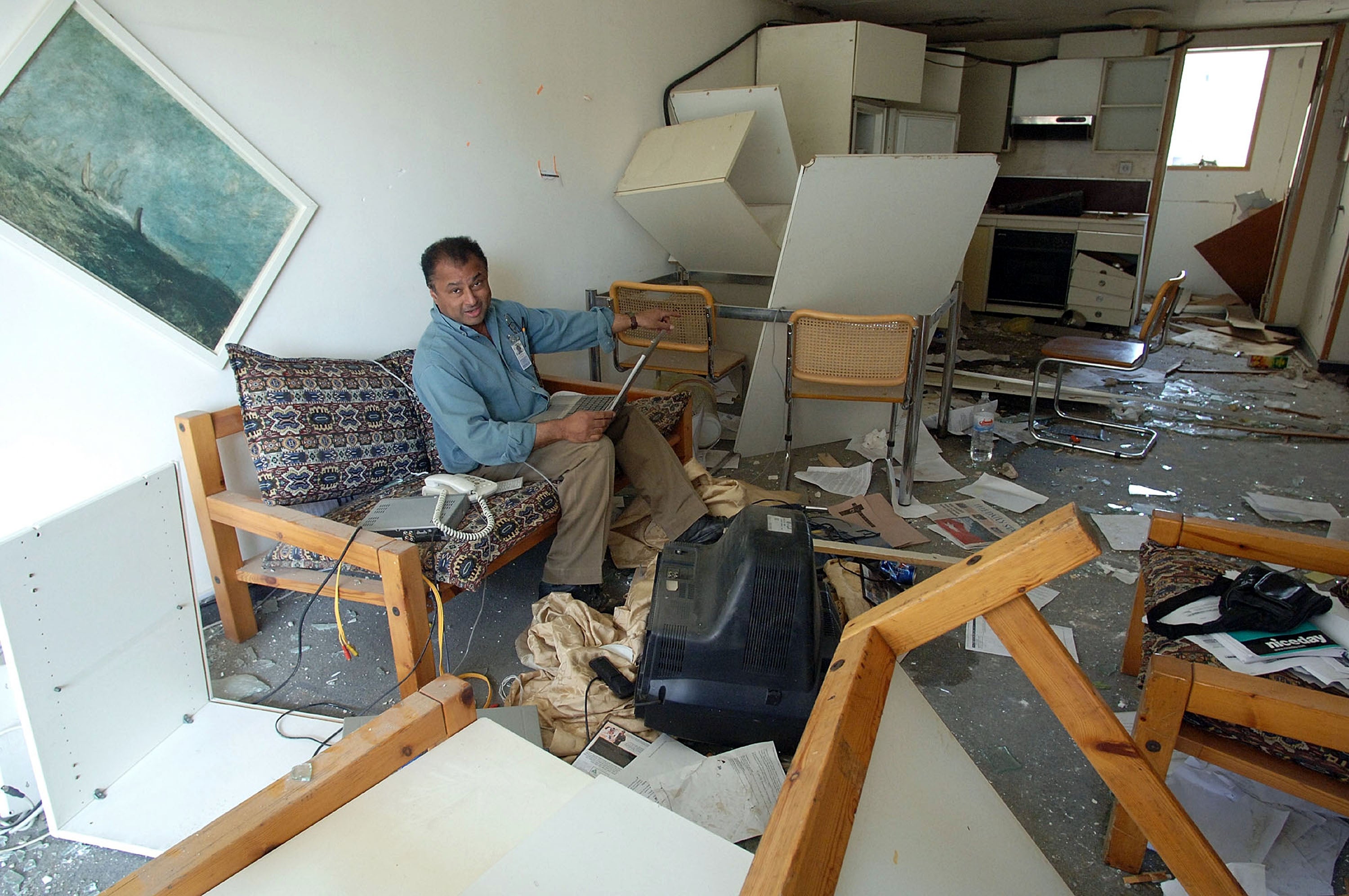The Iraq War hotel bombing that almost claimed my life
Kim Sengupta tells the story behind a remarkable picture from the height of Iraq’s deadly insurgency


Your support helps us to tell the story
From reproductive rights to climate change to Big Tech, The Independent is on the ground when the story is developing. Whether it's investigating the financials of Elon Musk's pro-Trump PAC or producing our latest documentary, 'The A Word', which shines a light on the American women fighting for reproductive rights, we know how important it is to parse out the facts from the messaging.
At such a critical moment in US history, we need reporters on the ground. Your donation allows us to keep sending journalists to speak to both sides of the story.
The Independent is trusted by Americans across the entire political spectrum. And unlike many other quality news outlets, we choose not to lock Americans out of our reporting and analysis with paywalls. We believe quality journalism should be available to everyone, paid for by those who can afford it.
Your support makes all the difference.Warnings had been coming for days that insurgents were planning to blow up a hotel in Baghdad used by foreigners. The sheer amount of lethal violence prevalent in 2005 often led to such rumours, but this one was persistent and seemed serious.
Most international news organisations in the Iraqi capital stayed behind the walls of the American-controlled Green Zone. We had always stayed outside and decided to continue doing so; security checks getting in and out of the zone were tremendously time-consuming and, besides, the queues were often targeted by bombers.
There seemed to be no point in moving from the Hamra; we spent a day looking at other hotels but none seemed to provide any better security, so we stayed.
At 8.20 the next morning, 18 November, a truck packed with explosives was driven into the blast wall at the back of the hotel, smashing it to bits. The plan was for a second truck with more explosives to drive through the gap into the complex and blow itself up; that would have brought down the building, killing those inside.
The first truck was packed with so much ordnance (around 400 pounds, it was later estimated) that it gouged a crater in the ground too big for the second truck, a two–and-half-ton flatbed with thousand pounds of explosives on board, to get through. As a result, the second driver blew up his explosives, and himself, a little way from the hotel buildings. Many adjoining houses collapsed and more than 60 were killed, mostly hotel employees and their families.
The real targets – journalists – escaped the worst. I was lying in bed, reading, and a horizontal shower of jagged glass flew over me across the room. My lethargy had saved me: I would have been seriously injured or worse if up and about. Instead, I got only cuts and bruises. A colleague, Catherine Philp from The Times, later found a ten-inch shard of glass sticking out of the mattress next to my pillow which I had not noticed.
There was wild gunfire which always seemed to follow bombs in Baghdad at the time. We went out after it died down and found bits of the bombers’ bodies; a piece of scalp in the swimming pool with thick, black bristly hair.
An American commander, Brigadier General Karl Horst, arrived to examine the wreck of the two lorries. Standing in a puddle made by shattered water pipes, we asked him why Sunni insurgents would want to do this.
“What makes you think it was the Sunnis?” he responded. He told us the Americans thought the bombing had been organised by some leading figures in the intelligence ministry fed up with reports we had been writing about death squads run by the Shia government.
Just a few days earlier, there had been uproar when we had described how 169 beaten and starving captives had been found in an underground prison run by the Shia Badr militia which controlled part of the Interior Ministry.
A few years later, I met the senior official who we thought had ordered the blast – still an influential member of the Iraqi government – at a diplomatic reception in London. Fuelled by several gin and tonics, I told him of the strong rumour he had been behind it. There was a sharp intake of breath all around, and minders tried to usher him off but he waved them away. Unfazed, he pinched the bridge of his nose as if trying hard to recall, and asked: “Remind me again, which month was the Hamra bombing?”
Join our commenting forum
Join thought-provoking conversations, follow other Independent readers and see their replies
Comments